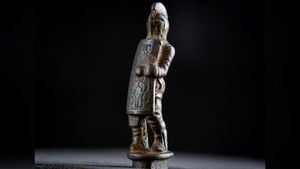The Church of England is once again embroiled in controversy, with the Bishop of Lincoln under increasing pressure to resign following the shocking revelations about child abuse within the church. The situation has escalated after reports emerged detailing the negligence of senior church officials, including Archbishop Justin Welby, who have been accused of failing to act decisively against John Smyth, a notorious abuser associated with the church.
The victim of Smyth's abuse, who has chosen to remain anonymous, has publicly called for Bishop Stephen Conway, the leader of the Diocese of Lincoln, to resign. He alleges Conway did not take adequate measures to address the abuse after being informed of Smyth’s misconduct. "He was the person in a position to stop John Smyth, bring him to justice, and he fundamentally failed," the victim stated, expressing deep frustration over the lack of accountability among senior church leaders.
At the heart of this scandal is the recently released Makin Review, which highlighted the systematic failures within the church hierarchy. The review revealed Smyth's heinous acts were known to church officials as early as the 1980s, yet warnings were ignored or inadequately pursued. This raised questions about the church's commitment to safeguarding its vulnerable members.
Bishop Conway acknowledged receiving allegations against Smyth back in 2013, but defended himself by claiming he acted within his authority as bishop. He expressed regret for not rigorously pursuing the matter with the Archbishop of Canterbury, stating, "I acknowledge fully my fault was not rigorously pursuing Lambeth about the province-to-province communication." Conway mentioned his attempts to support victims and survivors, indicating he provided disclosures about Smyth to higher church authorities.
Justin Welby, who only recently resigned from his position, faced immense scrutiny as the Makin Report detailed not only Smyth's extensive history of abuse involving possibly 130 victims but also the church’s failure to report him to law enforcement when it could have made a difference. Welby admitted to struggling with the church’s historic failings and the trauma inflicted on the victims. He stated, "The Makin review has exposed the long-maintained conspiracy of silence about the heinous abuses of John Smyth," reflecting on his own shortcomings and those of his predecessors.
Despite Welby’s claims of ignorance about the severity of Smyth’s actions until 2013, calls for his resignation intensified when activists pointed out systemic issues embedded within the church culture, which they describe as an “old boys' club.” This phrase captures the essence of the perceived protection afforded to abusive figures, allowing them to evade accountability for years, all the way until their deaths. One church member, speaking out against the institution, criticized the clerical culture, stating, "The church is very much still operating under this old boys' club mentality, where protecting reputations often trumps the truth and justice for victims."
Repercussions for the Church of England have been severe, with parishioners and clergy demanding radical reforms alongside accountability for past crimes. Sir Keir Starmer, the leader of the opposition party, commented, "Smyth’s victims have been failed very, very badly," and provided backing for the victims by emphasizing the need for the church to prioritize safeguarding children and vulnerable individuals moving forward.
The Makin Review also indicated serious lapses at various levels of church governance, leading many within the Church of England to question its credibility concerning safeguarding practices. Traditional support structures appear battered, exposing fissures within as church members, both lay and clerical, demand transparency and responsibility for the pervasive abuse tolerated under past administrations.
Among the voices echoing the need for change is Helen-Ann Hartley, the Bishop of Newcastle, who emphasized the urgency of creating effective safeguarding measures, arguing, "Our church cannot have a moral voice when we cannot get our own house in order." Her call reflects widespread calls for substantive policy changes within the institution to prevent future abuses and safeguard members.
The scale of Smyth’s abuse – involving physical, sexual, psychological, and emotional trauma against young boys – reveals the catastrophic impact of institutional negligence. Victims have detailed their harrowing experiences at the hands of the former barrister, who was known for coercing children at church camps, subjecting them to brutal beatings under the pretense of delivering religious instruction and discipline.
Several other victims have come forward, sharing their accounts. They include individuals already noted as church leaders, like Bishop Andrew Watson, who revealed he himself was victimized by Smyth. His disclosure reopened discussions about the accountability owed not just to the victims but to society’s broader expectations of institutions like the Church of England.
Indeed, the Makin Review’s findings have wrought consequences beyond individual resignations. The church now faces demands for systemic reforms and thorough evaluations of its safeguarding practices. Under heightened scrutiny from the media and public alike, the Diocese of Ely expressed its commitment to reviewing recommendations from the report and ensuring the safety of all individuals within its church communities.
Conway's comments about pursuing awareness of Smyth’s actions within the Church of South Africa underline the necessity of cooperation between churches globally, highlighting how oversight failures can have international ramifications.
Following Welby’s resignation, many are calling for additional measures to not only address historical wrongs but to establish effective oversight protocols to prevent such events from repeating. Activists assert this must be accompanied by genuine support for victims as they navigate the aftermath of trauma.
The next steps for the Church of England involve reconciling with its dark history and reassuring its members – both current and future – of its commitment to safeguarding against abuses. Activists are hopeful for transformative changes within the institution, seeking to make it not only accountable but also beneficial for the communities it is meant to serve.
This entire scenario continues to evoke strong emotions, as many question how such atrocities could be allowed to materialize within such venerable institutions. The Church of England stands at a crossroads, needing to choose between maintaining its historical traditions or striving to become a safe haven for all.
Moving forward, the nation watches cautiously. Can the Church of England emerge from this scandal with its integrity intact? Or has it already lost the trust of its community it so dearly needs to heal?



